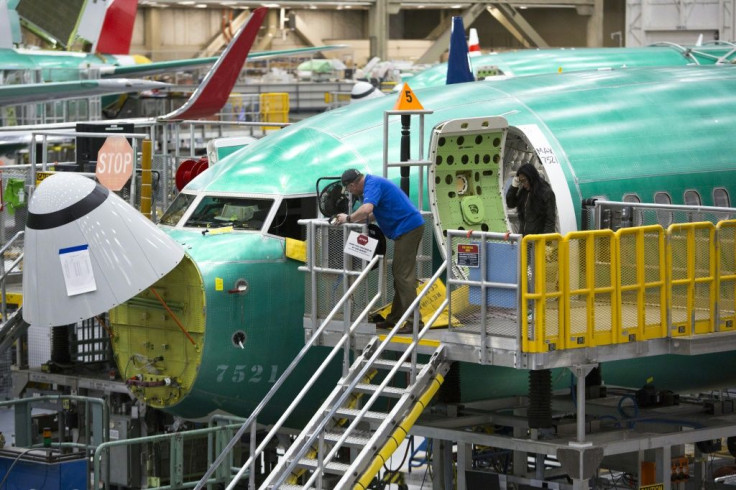Boeing Reports First Loss Since 1997 As MAX Costs Rise To $18.6 Bn

Boeing reported its first annual loss in more than two decades Wednesday as the lengthy grounding of the 737 MAX undercut the company's revenues and exploded costs.
The aerospace giant reported a $1.0 billion loss in the fourth quarter and a loss of $636 million for all of 2019, the company's first year in the red since 1997.
Newly-installed chief executive David Calhoun, who took the reins this month to stabilize the situation, pledged to turn the company around even as Boeing disclosed $9.2 billion in additional costs connected to the MAX, essentially doubling the bill from the disaster.
Some analysts had expected new costs twice as high, and despite the hefty charges, Boeing shares advanced Wednesday.
The MAX has been grounded since March following two crashes that killed 346 people and opened the doors to intense scrutiny of Boeing's safety practices, sparking bruising congressional investigations that revealed a troublesome culture at the aviation giant.
"We are committed to transparency and excellence in everything we do," Calhoun said in a statement. "Safety will underwrite every decision, every action and every step we take as we move forward."
Calhoun has been at the helm of Boeing only since January 13 after Dennis Muilenburg was ousted in December following criticism of his handling of the crisis, and immediately after a damning series of internal communications were released.
Calhoun is targeting mid-2020 to win approval from aviation regulators to resume flights on the MAX, which is seen as a realistic timeframe after Muilenburg repeatedly pushed a more optimistic schedule.
Calhoun told CNBC that he was "confident as a CEO can be" of the current timetable, adding that "we put together a schedule we think we can make."
The grounding of the MAX dented Boeing's earnings in multiple ways, among the most damaging of which was a halt in deliveries of new planes to customers, a major source of revenue.
Boeing revenues in the fourth quarter plunged 36.8 percent to $17.9 billion, while revenues for all of 2019 dropped 24.3 percent to $76.6 billion.
The crisis also prompted the manufacturer to first reduce and then halt production of the MAX.
Boeing said Wednesday the changes in the production schedule added $2.6 billion in costs connected to airplane deliveries, plus another $4 billion in "abnormal production costs," which are primarily in 2020 and associated with the suspension of the MAX plus a "gradual resumption" of production.
Chief Financial Officer Greg Smith said MAX production will be at "low rates" in 2020, with increases "over the next few years."
The company set aside $2.6 billion to compensate airlines that have been forced to cancel thousands of flights due to grounded MAX planes and undelivered aircraft.
With these costs and expenses disclosed previously, the total impact on Boeing is $18.6 billion.
S&P said after the earnings report that Boeing remained under review for a possible downgrade in its credit rating, saying it would resolve its outlook once it has more information on when Boeing will resume deliveries and production, among other issues.
The MAX crisis has also weighed on numerous suppliers, such as Spirit AeroSystems, which announced earlier this month that it would lay off 2,800 employees in Kansas due to the production stoppage.
And General Electric, which builds engines for the MAX, said the crisis lowered cash flow by $1.4 billion for 2019.
Boeing also announced Wednesday that it would again cut back production of the 787 Dreamliner, a top-selling plane that has supported revenues during the protracted 737 MAX grounding.
The aerospace giant plans to trim production to 10 airplanes a month in early 2021 through 2023 based on the "near-term market outlook," Boeing said.
The company in October had dropped production to 12 a month from 14 due to lower orders from China.
A note from JPMorgan Chase said Boeing's charges on the MAX were "less than feared," although the company was expending cash at a faster rate than expected. Boeing has reportedly lined up $12 billion in loans, but "balance sheet management" in 2020 will be an area for questions, the note said.
In another non-MAX development, Boeing set aside $410 million to cover costs of an additional uncrewed mission after the December NASA flight did not reach the International Space Station.
"NASA is evaluating the data received during the December 2019 mission to determine if another uncrewed mission is required," Boeing said.
Boeing shares rose 1.7 percent to $322.02.
© Copyright AFP 2024. All rights reserved.




















